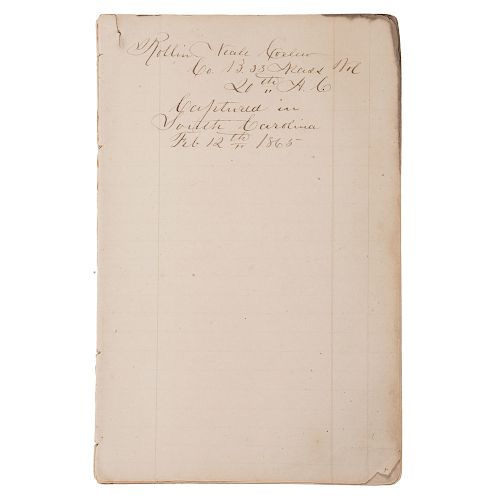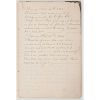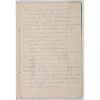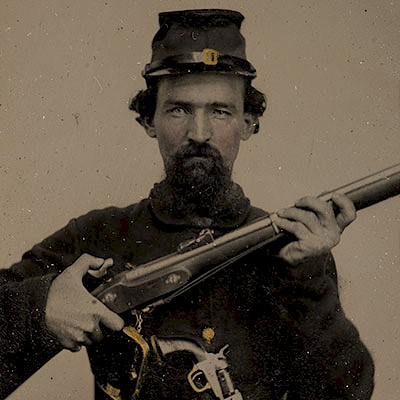Rollin Neale Corlew, 33rd Massachusetts Volunteers, 1865 Diary, Captured in South Carolina
About Seller
6270 Este Ave.
Cincinnati , OH 45232
United States
With offices in Cincinnati, Cleveland and Denver, Cowan’s holds over 40 auctions each year, with annual sales exceeding $16M. We reach buyers around the globe, and take pride in our reputation for integrity, customer service and great results. A full-service house, Cowan’s Auctions specializes in Am...Read more
Two ways to bid:
- Leave a max absentee bid and the platform will bid on your behalf up to your maximum bid during the live auction.
- Bid live during the auction and your bids will be submitted real-time to the auctioneer.
Bid Increments
| Price | Bid Increment |
|---|---|
| $0 | $25 |
| $500 | $50 |
| $1,000 | $100 |
| $2,000 | $250 |
| $5,000 | $500 |
| $10,000 | $1,000 |
| $20,000 | $2,500 |
| $50,000 | $5,000 |
| $100,000 | $10,000 |
About Auction
Jun 21, 2019
On June 21, Cowan’s Auctions will be offering a remarkable selection of historic photography, letters, documents, flags, political ephemera, and more representing the Revolutionary War-period through the Civil War, Indian Wars, and beyond, as well as the American West. Cowan's Auctions dawnie@cowans.com
- Lot Description
Civil War diary, uncovered, approx. 5 x 7.25 in., 108pp. (30 pages containing diary entries and 7 containing miscellaneous notes). Written by Private Rollin Neale Corlew, of Company B, 33rd Massachusetts Volunteers. Diary has some pages missing at back, and is accompanied by a photocopy of the original diary cover, which identifies Corlew and reads, in part, " Captured in South Carolina, Feb 12th 1865 ." Entries span February through June 1865 with references to many notable subjects including, but not limited to, a skirmish with Confederate Generals Joseph E. Johnston's and Lieutenant General William J. Hardee's forces, orders and a visit from General Sherman, the occupation of Goldsboro, NC, the surrenders of Generals Lee and Johnston, Castle Thunder, Libby Prison, and a grand reception at Washington, DC attended by Generals Grant, Sherman, Meade, Hooker, and Underwood, along with President Andrew Johnson.
Rollin Neale Corlew (d. 1911) enlisted in the US Army as a private on June 2, 1862. He was mustered into Company B of the 33rd Massachusetts Volunteer Infantry two months later. Though little can be ascertained about Corlew's specific experiences in the Civil War prior to the date of his first diary entry, it is known that his regiment was present at the Battle of Chancellorsville, repelled Confederate forces at Gettysburg between East Cemetery Hill and Culp's Hill, and engaged in battles at Wauhatchie, Lookout Mountain, and Missionary Ridge. The regiment continued its heavy involvement in major battles of the war in 1864, with action at Resaca, Dallas, Kenesaw Mountain, the siege and occupation of Atlanta, the infamous March to the Sea, the northward march through Georgia and the Carolinas, and finally Averasboro and Bentonville.
Corlew's first entry takes place about a month before the battles at Averasboro and Bentonville, NC, with numerous ensuing entries about marching toward those locations, including an entry on February 16 in which Corlew, encamped just outside of Columbia, SC, describes hearing " very heavy cannonading ," presumably part of Sherman's attack on the city. Corlew's entry on March 4, 1865 marks his regiment's crossing of the line between North and South Carolina, and his entry on March 16 mentions the regiment's first skirmish in what was the Battle of Bentonville. Corlew writes, " Marched 4 miles and met the enemy, at 9 o'clock and skirmished. Our Regiment lost 1 killed & 11 wounded. " Three days later, Corlew gives more details from the battle, writing, " Marched about 3 or 4 miles when we heard the booming of cannon, so we knew that the enemy was near. Marched about 6 miles when we found Johnston & Hardee with their forces. Two divisions of our corps and two of the 14th fought them. Captured a battle flag and sword. " The next day Corlew records orders to his regiment from General Sherman to stand their ground, along with a promise that he would bring the " right wing of the army " with him as soon as he could. The Battle of Bentonville ended on March 21, with Johnston withdrawing his army northward.
Corlew's entries then turn to his march toward Goldsboro, NC. Upon reaching the town on March 24, Corlew writes, " Arrived at Goldsboro today and commenced to build quarters. We have very cool nights. Expect a mail in a day or two. A great many of our troops are dressed in rebel clothes as their own are all worn out. " Good news comes to the men at Goldsboro on April 6, the same day that Corlew's corps are reviewed by Major General Mower, when Corlew writes, " Richmond officially reported taken with 25000 prisoners, 50 pieces of artillery besides a lot of small arms. " It appears that Corlew and his fellow troops remained in Goldsboro as part of Sherman's occupation of the town, until April 10, when they set out for Raleigh. Corlew mentions a skirmish that same day, but he records an even more noteworthy event just two days later, on April 12, writing, " While passing through Smithfield news came to us of the surrender of Lee with his whole army. Billy Sherman gives Johnston the same conditions on which Lee surrendered to Grant. Hope he will do so. " Corlew and company arrive in Raleigh on April 13, and he mentions an interesting ordeal involving Union General Hugh Judson Kilpatrick and CSA Cavalry General Joseph Wheeler: " After the town was surrendered, and Gen. Kilpatrick was advancing to take possession, he was fired into by some of Wheeler's cavalry. I[n] retaliation (for one of his staff offers was wounded) he pursued and overtook one of the enemy and hung him on the spot. "
Many of Corlew's subsequent entries reveal his anxiousness for General Johnston to surrender. On April 15, he writes, " Staid in camp. Sherman says that the campaign is over. Expect Johnston to surrender every day. Hope he will and that before long. " Corlew and his compatriots receive an encouraging visit from General Sherman on April 22, which Corlew describes fondly: " It does a soldier good when he sees this man. " The awaited surrender of Johnston finally comes to Corlew on April 28 on the way back from Raleigh. His succinct response says it all: " Our fighting is over. "
The next day, nearly two weeks after the assassination of Abraham Lincoln, Corlew and his fellow soldiers pay tribute to the fallen President. Corlew records, " Firing a salute for the death of our country's best friend Abraham Lincoln. May his murderers be avenged [sic]. " Continuing on the march toward Washington, DC, Corlew laments another tragic aspect of the war when he passes through Castle Thunder and Libby Prison on May 11. He writes, " Marched through Richmond passing by Castle Thunder and Libby Prison, where so many of our fellow soldiers have been starved to death...Considerable of the city was burnt by the army before they evacuated it, but enough remains to show what it once was. Trade of all description is going on the same as if there had never been any war. " Along the way, Corlew also revisits the battlefield of Chancellorsville two years after fighting there. His only observation is that " The ground looks pretty familiar after being away... "
Corlew's most sentimental and triumphant entry comes on May 24, when his corps finally reaches Washington, DC. Corlew records, " The greatest sight that ever happened on this continent came off yesterday and to day [sic]. Our corps passed through the city of Washington welcomed by thousands of citizens. The day was very fine. Gens. Grant, Sherman, Meade, Hooker, and Underwood (the latter our old colonel) besides Pres. Johnson. " By this time, payment and official discharge were on the horizon for Corlew and his company. Amidst a few visits from General George V. Underwood, Jr. and a serious case of colic, Corlew exhibits his desire to return home. In an entry on June 10, he predicts that he will get mustered out some time that day, however research shows that his official discharge took place a day later.
Corlew's diary entries end on June 16. A few additional inscribed pages throughout the diary include a ledger of weekly rent, work wages, and other miscellaneous notes. It is known that Corlew became a member of the GAR in Boston, and that he died on February 8, 1911. His diary, though it spans a relatively small window of time, provides not only a fascinating array of references to some of the major figures and events of the Civil War, but also a gripping snapshot of a soldier's life during the last year of the great conflict.Diary is uncovered, with many pages loose from binding and worn/brittle at binding edge and corners. Some pages have been removed from back of diary. Some water staining and soiling to certain pages. Inscriptions are mostly unaffected, clear, and legible.Condition
- Shipping Info
-
Buyers are required to pay for all packing, shipping and insurance charges. Overseas duty charges are the responsibility of the successful Bidder. Be aware that for larger and/or valuable items, shipping charges can be substantial. - If there is no shipping amount on listed your invoice, you will need to make arrangements to pick up or ship your purchase through an alternative shipping company. Our shipping department can be contacted at 513.871.1670 (ext. 219) or email shipping@cowans.com. - Shipping charges include insurance for your order while in transit. If you have private insurance we will adjust your charge to include only packing and shipping. - Please allow 14 – 21 days after payment to package and ship your purchase as carefully as possible.
-
- Buyer's Premium



 EUR
EUR CAD
CAD AUD
AUD GBP
GBP MXN
MXN HKD
HKD CNY
CNY MYR
MYR SEK
SEK SGD
SGD CHF
CHF THB
THB













